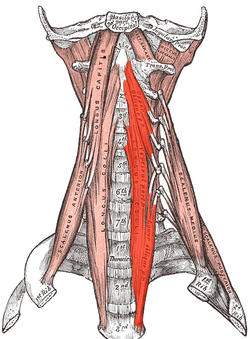Longus colli muscle
| Longus colli muscle | |
|---|---|
 The anterior vertebral muscles. (Longus colli labeled vertically at center left and center right.) | |
| Details | |
| Origin | Transverse processes of C-5 to T-3 |
| Insertion | Anterior arch of the atlas |
| Artery | Ascending Pharyngeal and Vertebral Arteries |
| Nerve | C2-C6 |
| Actions | Flexes the neck and head |
| Identifiers | |
| Latin | musculus longus colli |
| Dorlands /Elsevier | m_22/12549740 |
| TA | A04.2.01.002 |
| FMA | 13370 |
The Longus colli muscle (Latin for long muscle of the neck) is a muscle of the human body.
The Longus colli is situated on the anterior surface of the vertebral column, between the atlas and the third thoracic vertebra.
It is broad in the middle, narrow and pointed at either end, and consists of three portions, a superior oblique, an inferior oblique, and a vertical.
- The superior oblique portion arises from the anterior tubercles of the transverse processes of the third, fourth, and fifth cervical vertebræ and, ascending obliquely with a medial inclination, is inserted by a narrow tendon into the tubercle on the anterior arch of the atlas.
- The inferior oblique portion, the smallest part of the muscle, arises from the front of the bodies of the first two or three thoracic vertebræ; and, ascending obliquely in a lateral direction, is inserted into the anterior tubercles of the transverse processes of the fifth and sixth cervical vertebræ.
- The vertical portion arises, below, from the front of the bodies of the upper three thoracic and lower three cervical vertebræ, and is inserted into the front of the bodies of the second, third, and fourth cervical vertebræ.
Clinical significance
It is commonly injured in rear end whiplash injuries, usually resulting from a car crash.
This muscle is in front of the spine and is thought by some scientists that it may cause some whiplash patients to have an unnatural lack of curvature in the patients' neck.
Additional Images
- Longus colli muscle
- Longus colli muscle
- Longus colli muscle
References
This article incorporates text in the public domain from the 20th edition of Gray's Anatomy (1918)
External links
This article is issued from
Wikipedia.
The text is licensed under Creative Commons - Attribution - Sharealike.
Additional terms may apply for the media files.